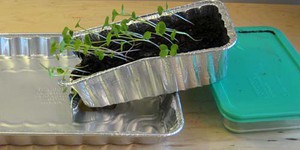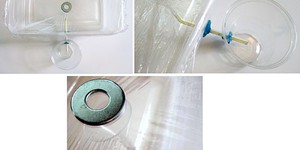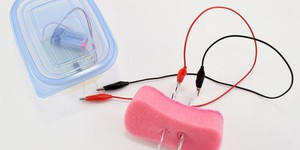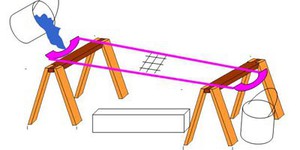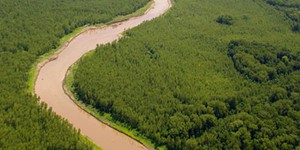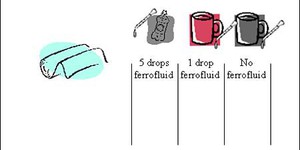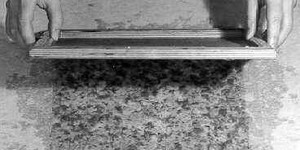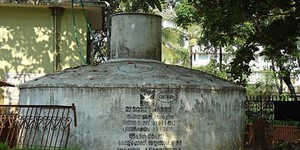Eighth Grade, Environmental Engineering Science Projects (14 results)
The human population on Earth is now more than 7.5 billion, and growing quickly. With more and more of us living an energy-intensive, modern lifestyle, the environmental stresses from human activity continue to increase. Greenhouse gases leading to global warming and fertilizer runoff resulting in marine "dead zones" are just two examples of large-scale environmental impacts from human activity. See how science, engineering and technology can help us take good care of our environment while still enjoying the comforts of a modern lifestyle.
|
Select a resource
Sort by
|
Soil erosion can cost the world billions of dollars every year by washing pollutants into our streams and rivers and by causing the loss of farmland. What can you do about this problem? Help save the world (and some money!) with nothing more than a few plants!
Read more
How can seawater from the oceans be turned into fresh water that is suitable for people to drink? Through a process called solar desalination! In this science project, you will make a solar desalination apparatus using readily available materials, and a power source that is free. How much water can the device produce, and is it still salty at all? What factors affect how effectively saltwater is turned into fresh water?
Read more
New
Have you ever noticed that on a hot day, it's more comfortable to wear a light-colored shirt than a dark one? Or that it's cooler in a park than walking down a street? This happens because different surfaces absorb and reflect heat in different ways. Urban heat islands are parts of cities where man-made surfaces like pavement and buildings replace natural surfaces like grass and trees. In this project, you will use temperature and satellite data to see if certain areas in a city have higher…
Read more
Water is a valuable resource, and water shortages are a serious problem in many parts of the world. The problem can be made worse by people who waste water; for example, by watering a garden or using sprinklers on their lawn (or a farmer taking care of an entire field) when it has rained recently or the soil is already moist. How can you help conserve water and prevent such waste? One way is to build an electronic soil moisture sensor. This project will show you how to build a circuit that…
Read more
Did you know that there is plastic in the ocean? It probably isn't too hard to imagine that some of the plastic that litters roadways, sidewalks, and parks finds its way into the ocean. So, how much do you think is in there? Hundreds of pounds of plastic? How about thousands of pounds? No one knows for sure, but estimates, based on scientific surveys, suggest the amount is in the range of millions of pounds of plastic! Of course, the ocean is big, over 300 million square kilometers, so…
Read more
Your drinking water probably started out brown and muddy. Are you surprised? Maybe you were picturing it flowing from a clean mountain spring instead? All over the world, including in 68% of American homes, people get their drinking water from rivers, lakes, and other surface waters. This water is filled with dirt, debris, and other contaminants as it travels hundreds of miles. So, how does your drinking water go from brown and muddy to crystal clear? Often, flocculants—substances that…
Read more
New
Remembering to take medicine at the right time can be hard, especially if you need to take multiple medications at different times of day. It might not be a big deal if you forget to take your daily multivitamin, but for some people, forgetting to take medication at the right time can be dangerous. What if you had a device that could not only set off an alarm at the right time, but also automatically dispense the right pills for you? In this project, you will build an automatic medicine…
Read more
The enormous task of cleaning up oil spills in oceans and seas has burdened industry, government, and environmentalists for decades. The cleanup is almost always difficult. It involves great amounts of time, resources, and money to remove the oil from the water, and the cleanup is often only partially successful. Today, however, scientists are coming to the rescue, developing a new technique that combines nanotechnology and magnetism. In this science project, you will test the proposed…
Read more
If you're interested in arts and crafts, you might like this project. It uses several alternative, renewable sources of fiber to make paper, and compares the resulting papers for strength and writing quality.
Read more
We are all familiar with the nursery rhyme, "Rain, rain, go away, come again some other day...", or
the song "Singin' in the Rain." Numerous songs and stories describe our feelings about rain. Why so many?
Because we humans understand how important rain is to our well-being. Rainfall, as part of the
water cycle, brings water back to Earth that had previously evaporated or transpired
from the surface. When water vapor in the atmosphere condenses into clouds and falls back to Earth as rain,…
Read more
When pesticides are applied to protect crops, run-off of potentially harmful pesticides is a major problem. Can water plants such as hardstem bulrush, common cattail, parrotfeather and smooth scouring rush promote pesticide breakdown? If so, diversion of irrigation run-off into plant-filled ponds could help reduce pesticide pollution. Mix malathion at 12.5% of the recommended application strength (to simulate dilution by rain or irrigation water). Use 5-gallon buckets for testing various…
Read more
Is there a public park, playground, or beach near you that suffers from a litter problem? Here is a way that you can do something about it! First, get a measure of the size of the problem by conducting a litter survey. Select a fraction of the area to survey at regular intervals (e.g., every two or three days, or maybe once a week). The area should be large enough so that you can get a representative sample of litter, but not so large that you can't clean it up. Each time you conduct your…
Read more
|
Explore Our Science Videos
Model a Lung Infection
DIY Mini Drone Part 1: Build Your Drone
Build a Self-Driving Arduino Car


